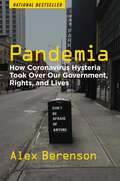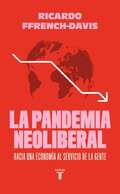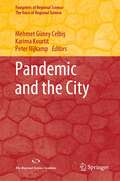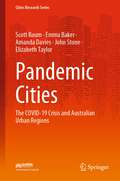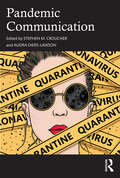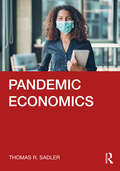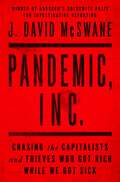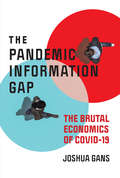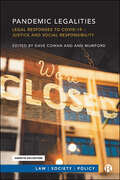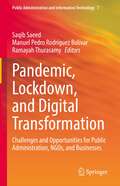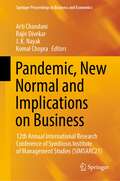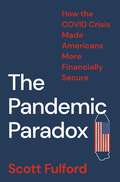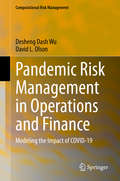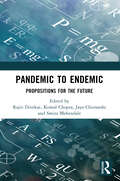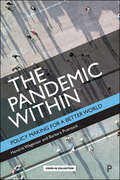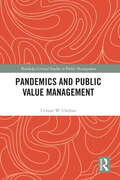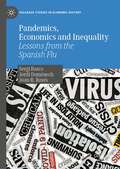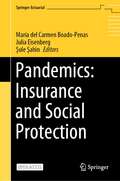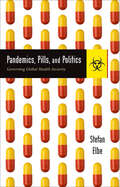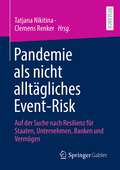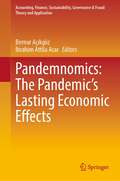- Table View
- List View
Pandemia: How Coronavirus Hysteria Took Over Our Government, Rights, and Lives
by Alex BerensonThe most important fact about the coronavirus pandemic that turned the world upside down in 2020 is that our response to it has been an epic overreaction driven by a disastrous confluence of public and private interests—all of them purporting to &“follow the science.&” Since the lockdowns began, millions of Americans have relied on the reporting of Alex Berenson. Exposing the hysteria and manipulation behind the worst failure of public policy since World War I, this clear-eyed journalist has been a critical source of reason and truth. The product of relentless investigation and research, Pandemia explains how an illness that many people will never even know they had became the occasion for economically ruinous lockdowns and the suppression of personal freedom on a previously unimaginable scale. Dispassionate, factual, and untainted by any agenda other than telling the truth, this is the account that pandemic-weary Americans desperately need.
La pandemia neoliberal
by Ricardo Ffrench-DavisUn ensayo que analiza críticamente el sistema económico neoliberal. Ricardo Ffrench-Davis repasa en este ensayo los efectos que ha generado el sistema neoliberal tanto en la economía como en la sociedad, poniendo su mirada tanto en las consecuencias generadas en Chile como en el mundo, producto de la globalización. El ensayo finaliza dando cuenta de que, a pesar de lo que sostengan algunos indicadores y gobiernos, estamos muy lejos del desarrollo de otras economías, por lo que realiza una propuesta económica centrada en un crecimiento inclusivo y participativo.
Pandemic and the City (Footprints of Regional Science)
by Mehmet Güney Celbiş Karima Kourtit Peter NijkampThis book features a collection of novel and original contributions to the study of urban sustainability from a human health perspective in the light of the current corona pandemic and the challenge of cities to offer inclusive, appealing, and healthy infrastructures. Written by experts from various disciplines, this book analyzes the impact of the corona pandemic on contemporary cities, and how these cities respond to the challenges. Featuring also case studies on various cities and regions, it addresses four interconnected research challenges and themes: Cities, cooperation, and resilience in the face of COVID-19Comparative approaches on patterns and effects of city and location-specific policies and socioeconomic structures during COVID-19The socioeconomic and labor market effects of pandemics on cities and local economiesThe need for new types of data and applications in addressing challenges in analysing the effects of COVID-19 on citiesThis book will appeal to scholars of regional and spatial science, urban economics, and urban planning and anyone interested in the impact of corona pandemic on city life.
Pandemic Cities: The COVID-19 Crisis and Australian Urban Regions (Cities Research Series)
by Scott Baum Emma Baker Amanda Davies John Stone Elizabeth TaylorThis book highlights the impact of the COVID-19 pandemic on cities. The COVID-19 pandemic and the associated economic and social impacts have been felt around the world. In large cities and other urban areas, the pandemic has highlighted a number of issues from pressures on urban labour and housing markets, shifts in demographic processes including migration and mobility, changes in urban travel patterns and pressures on contemporary planning and governance processes. Despite Australia’s relatively mild COVID exposure, Australian cities and large urban areas have not been immune to these issues. The economic shutdown of the country in the early stages of the pandemic, the sporadic border closures between states, the effective closure of international borders and the imposition of widespread public health orders that have required significant behavioural change across the population have all changed our cities in some and the way we live and work in them in some way. Some of the challenges have reflected long-standing problems including intrenched inequality in labour markets and housing markets, others such as the impact on commuting patterns and patterns of migration have emerged largely during the pandemic. This book, co-authored by experts in their field, outlines some of the major issues facing Australian cities and urban areas as a result of the pandemic and sets a course for future of the cities we live in.
Pandemic Communication
by Stephen M. Croucher Audra Diers-LawsonThis book details how the processes of communication are affected by the presence of a pandemic and establishes a research agenda for those effects across the broad field of communication studies. Through contributions from experts in communication subdisciplines such as crisis, organizational, interpersonal, health, intergroup, and intercultural, this book provides the reader with a comprehensive view of the emerging field of study "pandemic communication." Each chapter has four primary objectives to: (1) define critical issues for pandemic communication from its subdiscipline’s perspective, (2) examine how communication varies during pandemic(s), (3) provide examples of how pandemic(s) havefor affected communication, and (4) propose a research agenda to build pandemic communication theory. This book is suited to undergraduate or post-graduate courses or modules in communication studies across a variety of subdisciplines as well as a reference for researchers in the subject.
Pandemic Economics
by Thomas R. SadlerPandemic Economics applies economic theory to the Covid-19 era, exploring the micro and macro dimensions of the pre-pandemic, pandemic, and post-pandemic phases. Using core economic tools such as marginal analysis, cost-benefit analysis, and opportunity cost, this book explores the breadth of economic outcomes from the pandemic. It shows that a tradeoff between public health and economic health led to widespread problems, including virus infections and unemployment. Taking an international and comparative approach, the book shows that because countries implemented different economic policies, interventions, and timelines during the crisis, outcomes varied with respect to the extent of recession, process of recovery, availability of medical equipment, public health, and additional waves of the virus. Pedagogical features are weaved throughout the text, including country case studies, key terms, suggested further reading, and discussion questions for solo or group study. On top of this, the book offers online supplements comprising PowerPoint slides, test questions, extra case studies, and an instructor guide. This textbook will be a valuable resource for advanced undergraduate and postgraduate courses on pandemic economics, macroeconomics, health economics, public policy, and related areas.
Pandemic Governance: Learning from COVID and Future Pathways
by Walter Amedzro St-HilaireThis book attempts to analyze the issues raised by the chronicity of the Covid pandemic and its governance. The author analyzes the information resources mobilized to combat the pandemic in industrialized countries and pays particular attention to the operational mechanisms. The analysis seeks to clarify the modalities of operation of the crisis system management, while at the same time looking at the decision-making mechanisms. The main lines of analysis retained are: the piloting and management of the crisis, the markets for ordering protective equipment and vaccine, the hospital organization and the prevention campaign, and the costs and the methods of financing. Finally, the author asks whether it might not therefore be appropriate to rethink the organization of the pandemic’s governance and if health crisis governance should be opened up more to deal with societal challenges. This organization is too complex and suffers both from a certain heaviness and from a lack of resources, which are detrimental to its proper functioning. It should first and foremost be open to people in the field whose absence weighs heavily on the organization of the response to the pandemic. It should also be open to other specialties, even if they seem far removed from public health and medicine, if they are useful to the government in guiding its actions. Prof. Post-Dr. Walter Amedzro St-Hilaire is the author of more than 20 books and around 40 scientific articles. His specialization areas include portfolio management, project management, entrepreneurship policies, corporate and technology governance, business technology, strategic management, business economics, risk management, economic infrastructures, public administration, international development, and applied economics. He has taught at various universities in Canada and the USA. He has served as Chief Resources Economist and Principal Officer of Procurement Operations for UEB United European Bank and as a Technical Advisor on Economic Strategies and Policy Development for the World Bank. He is also a project economics and financial business expert for several institutions and international organizations.
Pandemic, Inc.: Chasing the Capitalists and Thieves Who Got Rich While We Got Sick
by J. David McSwane&“This startling, vital book deserves our attention.&” —San Francisco Chronicle For readers of War Dogs and Bad Blood, an explosive look inside the rush to profit from the COVID-19 pandemic, from the award-winning ProPublica reporter who saw it firsthand. The United States federal government has spent over $10 billion on medical protective wear and emergency supplies, yet as COVID-19 swept the nation, life-saving equipment such as masks, gloves, and ventilators was nearly impossible to find. In this brilliant nonfiction thriller, award-winning investigative reporter J. David McSwane takes us behind the scenes to reveal how traders, contractors, and healthcare companies used one of the darkest moments in American history to fill their pockets. Determined to uncover how this was possible, he spent over a year on private jets and in secret warehouses, traveling from California to Chicago to Washington DC, to interview both the most treacherous of profiteers and the victims of their crimes. Pandemic, Inc. is the story of the fraudster who signed a multi-million-dollar contract with the government to provide lifesaving PPE, and yet never came up with a single mask. The Navy admiral at the helm of the national hunt for additional medical resources. The Department of Health whistleblower who championed masks early on and was silenced by the government and conservative media. And the politician who callously slashed federal emergency funding and gutted the federal PPE stockpile. Winner of the Goldsmith Prize for Investigative Reporting, McSwane connects the dots between backdoor deals and the spoils systems to provide the definitive account of how this pandemic was so catastrophically mishandled. Shocking and revelatory, Pandemic, Inc. exposes a system that is both deeply rigged, and singularly American.
The Pandemic Information Gap: The Brutal Economics of COVID-19
by Joshua GansWhy solving the information problem should be at the core of our pandemic response: essential reading about the long-term implications of our current crisis.COVID-19 is caused by a virus. The COVID-19 pandemic is caused by a lack of good information. A pandemic is essentially an information problem: this is the enlightening and provocative idea at the heart of this book. If we solve the information problem, argues economist Joshua Gans, we can defeat the virus. For example, when we don't know who is infected, we have to act as if everyone is infected. If we actively manage the information problem--if we know who is infected and with whom they had contact--we can suppress the virus or buy time for vaccine development.This is an expanded version of an eBook originally published as Economics in the Age of COVID-19.
Pandemic Legalities: Legal Responses to COVID-19 – Justice and Social Responsibility (Law, Society, Policy)
by Dave Cowan and Ann MumfordThe effects of COVID-19 are visited disproportionately on the already disadvantaged. This important text maps out ways in which those already disadvantaged have been affected by legal responses to COVID-19. Contributors tackle issues including virtual trials, adult social care, racism, tax and spending, education and more. They reflect on the implications of COVID-19 and express concerns with policy and practice developments and with the neutral version of the law and the economy which has taken root. Drawing on diverse resources, this text offers an account of the damage caused by legal responses to the pandemic and demonstrates how the future response can be positive and productive.
Pandemic, Lockdown, and Digital Transformation: Challenges and Opportunities for Public Administration, NGOs, and Businesses (Public Administration and Information Technology #7)
by Saqib Saeed Manuel Pedro Rodríguez Bolívar Ramayah ThurasamyThis edited volume discusses digital transformation in the context of the COVID-19 pandemic. In the wake of the COVID-19 pandemic and the widespread lockdown policies that followed, digital technologies were touted as an effective means towards ensuring continuity and minimal interruption of day-to-day operations for businesses and other institutions. Digital transformation, however, is an inherently complex process and the pressure of short adoption times may further increase complexities for organizations looking to foster digital technologies. This volume comprises original research contributions on theoretical foundations and empirical studies of digital transformations in the pandemic era. Written by academics and practitioners from diverse disciplines and industries, the chapters cover topics such as psychological and technical implications of pandemic situations, the economic, organizational, social, and legal implications of digital adoption, and case studies for digital transformation in different industries. This book will be useful for academics, technology professionals, business policy makers, NGO managers, and governments looking to optimize their digital transformation processes to better prepare their organizations in the presence of pandemic situations.
Pandemic, New Normal and Implications on Business: 12th Annual International Research Conference of Symbiosis Institute of Management Studies (SIMSARC21) (Springer Proceedings in Business and Economics)
by Arti Chandani Rajiv Divekar J. K. Nayak Komal ChopraThis book focuses on the issues and challenges posed by COVID-19, proposing ways to deal with the supposed ‘new normal’ which the pandemic has introduced in the functioning of business, society, and environment. Among the issues discussed are employee well-being and mental health, impact of changes in education sector, marketing, selling and distribution of goods, change in business model for SME, impact on travel and personal grooming sector, consumer preferences, performance impact of intellectual capital, performance of banks-pre merger, and so on. Focus is on presenting strong research results backed by statistical analysis using different tools. There are managerial solutions to the problems being faced by businesses and firms. The presentations would throw great insights on how businesses have coped during pandemic times in a developing economy like India.
The Pandemic Paradox: How the COVID Crisis Made Americans More Financially Secure
by Scott FulfordWhy most Americans’ finances improved during the worst economic contraction since the Great Depression—and the policy choices that made this possibleIn March 2020, economic and social life across the United States came to an abrupt halt as the country tried to slow the spread of COVID-19. In the worst economic contraction since the Great Depression, twenty-two million people lost their jobs between mid-March and mid-April of 2020. And yet somehow the finances of most Americans improved during the pandemic—savings went up, debts went down, and fewer people had trouble paying their bills. In The Pandemic Paradox, economist Scott Fulford explains this seeming contradiction, describing how the pandemic reshaped the American economy. As Americans grappled with remote work, “essential” work, and closed schools, three massive pandemic relief bills, starting with the CARES Act on March 27, 2020, managed to protect many of America’s most vulnerable.Fulford draws from the Consumer Financial Protection Bureau's “Making Ends Meet” surveys—which he helped design—to interweave macroeconomic trends in spending, saving, and debt with stories of individual Americans’ economic lives during the pandemic. We meet Winona, who quit her job to take care of her children; Marvin, who retired early and worried that his savings wouldn’t last; Lisa, whose expenses went up after her grown kids (and their dog) moved back home; and many others. What the statistics and the stories show, Fulford argues, is that a better, fairer, more productive economy is still possible. The success of pandemic relief policy proves that Americans’ economic fragility is not an unsolvable problem. But we have to choose to solve it.
Pandemic Risk Management in Operations and Finance: Modeling the Impact of COVID-19 (Computational Risk Management)
by David L. Olson Desheng Dash WuCOVID-19 has spread around the world, causing tremendous structural change, and severely affecting global supply chains and financial operations. As such there is a need for analytic tools help deal with the impact of the pandemic on the world’s economies; these tools are not panaceas and certainly won’t cure the problems faced, but they offer a means to aid governments, firms, and individuals in coping with specific problems. This book provides an overview of the COVID-19 pandemic and evaluates its effect on financial and supply chain operations. It then discusses epidemic modeling, presenting sources of quantitative and text data, and describing how models are used to illustrate the pandemic impact on supply chains, macroeconomic performance on financial operations. It highlights the specific experiences of the banking system, which offers predictions of the impact on the Swedish banking sector. Further, it examines models related to pandemic planning, such as evaluation of financial contagion, debt risk analysis, and health system efficiency performance, and addresses specific models of pandemic parameters. The book demonstrates various tools using available data on the ongoing COVID-19 pandemic. While it includes some citations, it focuses on describing the methods and explaining how they work, rather than on theory. The data sets and software presented were all selected on the basis of their widespread availability to any reader with computer links.
Pandemic to Endemic: Propositions for the Future
by Divekar Rajiv Chopra Komal Chitranshi Jaya Mehendale SmitaThe pandemic wave of Covid 19 made many organizations in different sectors rethink their business strategy. The pandemic wave soon became an endemic and the organizations adapted themselves to the new ways of doing business. Endemic situation indicates that the Covid virus is here to stay but with limited impact. The book provides deeper research on how organizations adapted themselves to the post Covid situation and how they look at the future. The book covers studies from the areas of marketing, finance, human resource, operations, healthcare and education.
The Pandemic Within: Policy Making for a Better World
by Hendrik Wagenaar Barbara PrainsackCOVID-19 has exposed defects in our current political–economic order: extreme wealth inequality, an ideology-driven government, a greedy corporate sector, a precarious labour force and a looming climate catastrophe. This accessible book offers a unique blend of moral imagination and social–political analysis to overcome these defects. It focuses on two characteristics of contemporary societies – hegemony and complexity – that have inhibited our ability to imagine, and take seriously, better practices and institutions. Considering housing, work, governance, finance, climate change and more, this book presents feasible and pragmatic solutions which are informed by a comprehensive vision of a flourishing, sustainable and richly democratic society.
Pandemics and Public Value Management (Routledge Critical Studies in Public Management)
by Usman W. ChohanWidespread crisis-events such as pandemics can impose an immense strain on societies’ multi-stakeholder efforts to preserve and sustain the mechanisms of public value (PV) creation. The global coronavirus (Covid-19) pandemic exemplifies this because it has pushed civil society, public managers, politicians, and society-at-large into uncharted waters, and at times brought them under exceptional duress. Then how can public value’s agents attempt to conceive, create, and preserve value under such disruptive circumstances? How could public value theory’s (PVT’s) theoretical precepts be informed by the pandemic? This book seeks to inform the PVT literature by drawing upon interesting lenses that have emerged in the wake of the coronavirus pandemic. It addresses PVT’s notions of value conflicts, post-Truth politics, multilateral PV, nationalism and the public, comparative PV creation, and PV in developing-country contexts, in order to construct a multi-stakeholder and internationally informed set of analyses on public value’s systems and agents in uniquely distressing circumstances such as pandemics. This book will therefore be of use to both academics and practitioners of public administration and public policy, as well as scholars of government, healthcare policy, and economics.
Pandemics, Economics and Inequality: Lessons from the Spanish Flu (Palgrave Studies in Economic History)
by Sergi Basco Jordi Domènech Joan R. RosésThis Pivot book provides a framework for understanding the economic and potentially unequal effects of pandemics, focusing closely on the Spanish Flu. It provides an in-depth analysis of the different effects of the Spanish Flu on the economy from unequal mortality to wages, housing and output. There is a general review of the literature but an important feature of this book is that it explains results using data from Spain, an ideal country to perform this exercise, as its mortality data is not affected by the First World War. Spain was also developed enough to have reliable data, but it was very heterogeneous across regions which will allow a comparison of more and less developed regions. No other book exists that offers a comprehensive and data-driven view of the effects of the Spanish Flu, which is the closest pandemic example to Covid-19. With the outbreak of Covid-19 increasing the need to learn about the economic effects of pandemics, this book will be of interest to academics and students of economic history, macroeconomics (economic crises) and economic development, as well being accessible for the general reader.
Pandemics: Insurance and Social Protection (Springer Actuarial)
by María del Carmen Boado-Penas Julia Eisenberg Şule ŞahinThis open access book collects expert contributions on actuarial modelling and related topics, from machine learning to legal aspects, and reflects on possible insurance designs during an epidemic/pandemic.Starting by considering the impulse given by COVID-19 to the insurance industry and to actuarial research, the text covers compartment models, mortality changes during a pandemic, risk-sharing in the presence of low probability events, group testing, compositional data analysis for detecting data inconsistencies, behaviouristic aspects in fighting a pandemic, and insurers’ legal problems, amongst others.Concluding with an essay by a practicing actuary on the applicability of the methods proposed, this interdisciplinary book is aimed at actuaries as well as readers with a background in mathematics, economics, statistics, finance, epidemiology, or sociology.
Pandemics, Pills, and Politics: Governing Global Health Security
by Stefan ElbeThe fascinating story of Tamiflu's development and stockpiling against global health threats.orld's most prominent medical countermeasure, Tamiflu.A pill can strengthen national security? The suggestion may seem odd, but many states around the world believe precisely that. Confronted with pandemics, bioterrorism, and emerging infectious diseases, governments are transforming their security policies to include the proactive development, acquisition, stockpiling, and mass distribution of new pharmaceutical defenses. What happens—politically, economically, and socially—when governments try to protect their populations with pharmaceuticals? How do competing interests among states, pharmaceutical companies, regulators, and scientists play out in the quest to develop new medical countermeasures? And do citizens around the world ultimately stand to gain or lose from this pharmaceuticalization of security policy?Stefan Elbe explores these complex questions in Pandemics, Pills, and Politics, the first in-depth study of the world’s most prominent medical countermeasure, Tamiflu. Taken by millions of people around the planet in the fight against pandemic flu, Tamiflu has provoked suspicions about undue commercial influence in government decision-making about stockpiles. It even found itself at the center of a prolonged political battle over who should have access to the data about the safety and effectiveness of medicines.Pandemics, Pills, and Politics shows that the story of Tamiflu harbors deeper lessons about the vexing political, economic, legal, social, and regulatory tensions that emerge as twenty-first-century security policy takes a pharmaceutical turn. At the heart of this issue, Elbe argues, lies something deeper: the rise of a new molecular vision of life that is reshaping the world we live in.
Pandemie als nicht alltägliches Event-Risk: Auf der Suche nach Resilienz für Staaten, Unternehmen, Banken und Vermögen
by Tatiana Nikitina Clemens RenkerSchnell und agil lieferten erstmals via Zoom-Seminare renommierte Wissenschaftler aus Deutschland, Russland und Polen während der Pandemie 2020/2021 Antworten für mehr Widerstandsfähigkeit in Wirtschaft und Gesellschaft. Die zusammengefassten Beiträge bieten Lösungsanstöße für wirtschaftliche, soziale, rechtliche und gesellschaftliche Fragen aufgrund der Auswirkungen von COVID-19. Insbesondere werden die internationale Unternehmensbesteuerung, die Zukunft des Bankensektors, die Stabilität des Arbeitsmarktes, Entwicklungen auf den Immobilienmärkten, Optimierungen der städtischen Logistik, Herausforderungen für das Gesundheitssystems, die Sicherung der Beschäftigung, Probleme des Rentensystems und innovative Geschäftsmodelle thematisiert. Das International Centre for Financial Markets Research ICFMR der Staatlichen Universität für Wirtschaft Sankt Petersburg und der „Petersburger Dialog“ unterstützten die laufende Partnerschaft zwischen Deutschland und Russland in den schwierigen Zeiten: Für Frieden und Wohlstand.
Pandemnomics: The Pandemic's Lasting Economic Effects (Accounting, Finance, Sustainability, Governance & Fraud: Theory and Application)
by Bernur Açıkgöz İbrahim Attila AcarThis book comprehensively addresses the economic and social implications of the COVID-19 pandemic. In each chapter of the book, the effects of the pandemic on different economic and financial sectors are discussed.The book tackles many topics and issues that are of relevance in the post-pandemic world. Some of these issues are the effects of the pandemic on countries' budgets, tax systems, financial and economic policies, and management, in addition, the evaluation of the pandemic in terms of migration and refugees, the historic comparison of its effects with other pandemics, the social media reflections of the pandemic and the global governance discussions. The book also considers the effects of pandemic on the use of digital currencies and the effects of digitalization of employment and robot employment.
Pandesic: The Challenges of a New Business Venture (A)
by Joseph L. Bower Clark GilbertPandesic is a joint venture of SAP and Intel designed to develop turnkey information architectures for marketspace companies. The case explores the problems of developing the joint venture from the perspective of its general management. Describes the development of its strategy and organization. At the end of the case, performance is poor and Harold Hughes (Intel) steps in from his position as part-time chairman to run Pandesic.
Pandora Radio: Fire Unprofitable Customers?
by Willy Shih Halle TeccoPandora Radio is at a crossroads. Founder Tim Westergren has just been told by a well known VC to get rid of his unprofitable customers in order to get his costs down, but Westergren is not sure that such actions are consistent with his company's business model. Pandora Radio is the largest Internet music stream site, and its rapidly growing user base loves the free customizable music stream under an advertising supported model. Pandora has to pay royalties for every song streamed, and has other variable costs that scale linearly with hours consumed, but it has taken no steps to restrict the amount of usage among its heaviest and most loyal users. Can Pandora make its model work when a significant percentage of its users cause it to lose money?
Pandora Radio: Fire Unprofitable Customers?
by Halle Tecco Willy ShihPandora Radio is at a crossroads. Founder Tim Westergren has just been told by a well known VC to get rid of his unprofitable customers in order to get his costs down, but Westergren is not sure that such actions are consistent with his company's business model. Pandora Radio is the largest Internet music stream site, and its rapidly growing user base loves the free customizable music stream under an advertising supported model. Pandora has to pay royalties for every song streamed, and has other variable costs that scale linearly with hours consumed, but it has taken no steps to restrict the amount of usage among its heaviest and most loyal users. Can Pandora make its model work when a significant percentage of its users cause it to lose money?
